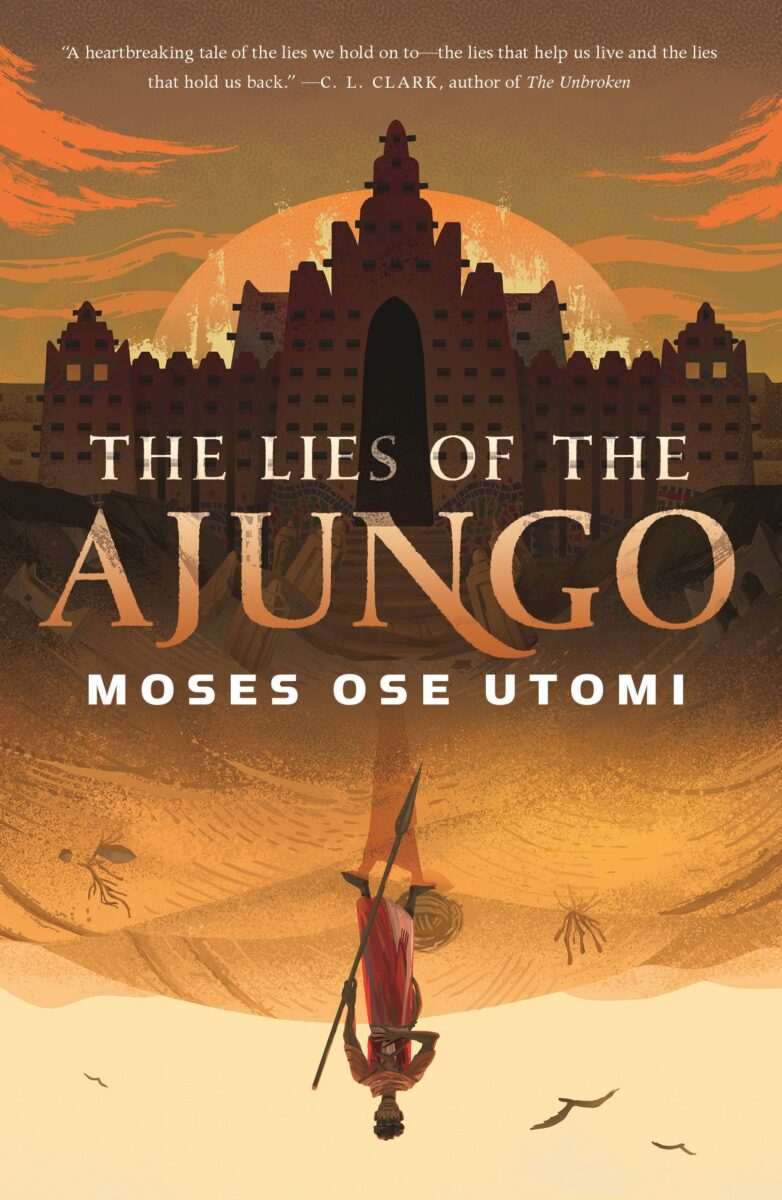That’s a Stephen King quote, by the way. The fuller quote is, “Fiction is a lie. Good fiction is the truth inside the lie.” It’s a statement that makes a complicated thing seem simple, which is another litmus test for good writing. Moses Ose Utomi succeeds on both accounts with The Lies of the Ajungo, a brutally good fable that’s simply told, belying the deep complexities at the heart of the story and the complicated emotions that go along with them.

Tutu is a boy on the cusp of manhood who lives with his mother in the City of Lies. The city, which was stripped of its original name by invaders calling themselves the Ajungo, has been deprived by its conquerors of all but the barest trickles of water, and its people are perpetually on the verge of dying of thirst. Unable to bear watching his mother slowly waste away, Tutu demands the right to go in search of water in the desert that surrounds the City in every direction. Only children younger than the age of 13 are allowed to embark on this quest; once they reach their majority, their tongues are cut out, another tribute demanded by the Ajungo. The Ajungo Empire means to break not only their bodies but their spirits, taking away their ability to name themselves or speak their own language, unable to tell their own stories without the presence of the Ajungo bearing down.
The people found new names and new ways to communicate, but only under the shadow of oppression. Raised in fear and deprivation, Tutu is incredibly strong but also deeply suspicious of everyone he encounters. Are they Ajungo? Do they want to inflict even more harm on him? He’s almost immediately forced to reckon with how to apply this strength and tame this anxiety, because he has no practical knowledge for surviving the desert. What travelers, what lessons should he trust, and what in the endless expanse is merely a mirage?
Utomi plays his cards close to his chest when it comes to Tutu’s quest. It’s clear that there’s a moral here, but he wisely withholds the true nature of the threat until the very end, doling out a careful breadcrumb trail for the reader to follow. The pacing is excellent, and the book is exactly as long as it ought to be, which is remarkable for a first novella. Not only that, but the way that Utomi is bold with his action but sly in his narrative reveals increases the sense of tension throughout.
The big climax will probably not come as a total surprise after all Utomi’s careful plotting, but it’s not meant to be a twist (thank goodness). It’s meant instead to twist Tutu’s—and the reader’s—sense of what a parable or fairy-tale should do. Who are the villains we should be confronting when we step outside of metaphor? Is evil something foreign, something Other—or is it intimate, familiar?
Along with the critique of easy moral absolutes, The Lies of the Ajungo also makes a dark and relevant point about another of the tropes SFF loves best, namely the teenage protagonist. To be clear, I have no overarching problem with this trope. Teens deserve the chance to see themselves as heroes as much as anyone else, and the young are just as capable of changing the world as everyone. However, it’s good to have counternarratives like The Lies of the Ajungo, the ones that critically examine the burdens we place on children to solve the problems we find too intractable. Just because Tutu is capable does not mean he should be wandering the desert in search of salvation for his people. One of his eventual companions jokes about being his wife, but Tutu is not doing this for romance. He longs for his mother only, and it’s a terrible world in which a child must work to save his parent and not the other way around.
Without revealing too much, I can say that the story succeeds at both a piercing criticism of the current moment as well as a timeless caution like any great fairy tale. It’s a parable for modern times, full of violence and promise. The Lies of the Ajungo was one of my most highly anticipated books of 2023, and I’m happy to say that it lives up to the hype and more. I was expecting a twisty, thrilling adventure tale, and while I certainly got that, I also got a fairy tale as gruesome and eternally timely as any Grimm brother could pull together.
I was overjoyed to discover that there will be a follow-up novella entitled The Truth of the Aleke, and I cannot wait. That book will be out in 2024; as for The Lies of the Ajungo, you fortunately only have to wait until March 21, 2023.
